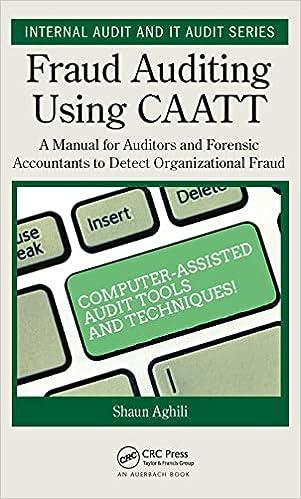Question
Expansion Inc.'s financial year ends on December 31, X5. All transactions for the period have been recorded in the books of the company. All that
Expansion Inc.'s financial year ends on December 31, X5. All transactions for the period have been recorded in the books of the company. All that remains is to regularize the accounts on December 31, X5, that is, before drawing up the S / F. To this end, we send you the following information:
a) The company completed work for a client valued at $ 3,000. However, the collection is expected in January X6. The accountant did not record the transaction.
b) On July 1, X5, the company borrowed $ 10,000 from its bank. The loan bears interest at 4% and is repayable in full (principal and interest) within one year, ie June 30, X6.
c) Depreciation of $ 5,000 must be recorded on the building.
d)On December 31, X5, the company received its electricity bill for the month of December. The balance is $ 500. The accountant did not record the transaction.
e) On July 1, X5, a one-year warehouse insurance premium was paid $ 1,000. Coverage was effective July 1, X5. The accountant charged all of this amount to the Insurance charges account.
f) In fiscal year X5, the company cash purchased office supplies for a total amount of $ 2,000, which was charged to the Supplies Inventory account. The Supply Inventory account balance at the start of the current fiscal year, January 1, X5, was $ 1,500. A count of the units in inventory at the end of the period established the value of the inventory at $ 500.
Record in the JG all adjustment postings required on December 31, X5.
please note Closing the accounts consists of transferring all income and expenses for the period to RND. Closing entries are therefore necessary in order to obtain the net income at the end of the period (without closing the accounts, the net income which will appear in the company's books will be that at the start of the period) . The ESF will therefore not be able to balance (Assets = Liabilities + Equity), unless it has previously closed all the accounts. I will not ask you to present the closing paperwork to the JG. On the other hand, as illustrated in module 3, you must calculate the closing net income before presenting the ESF (increase in net income from income realized, and decrease in net income from expenses incurred).
Step by Step Solution
There are 3 Steps involved in it
Step: 1

Get Instant Access to Expert-Tailored Solutions
See step-by-step solutions with expert insights and AI powered tools for academic success
Step: 2

Step: 3

Ace Your Homework with AI
Get the answers you need in no time with our AI-driven, step-by-step assistance
Get Started


